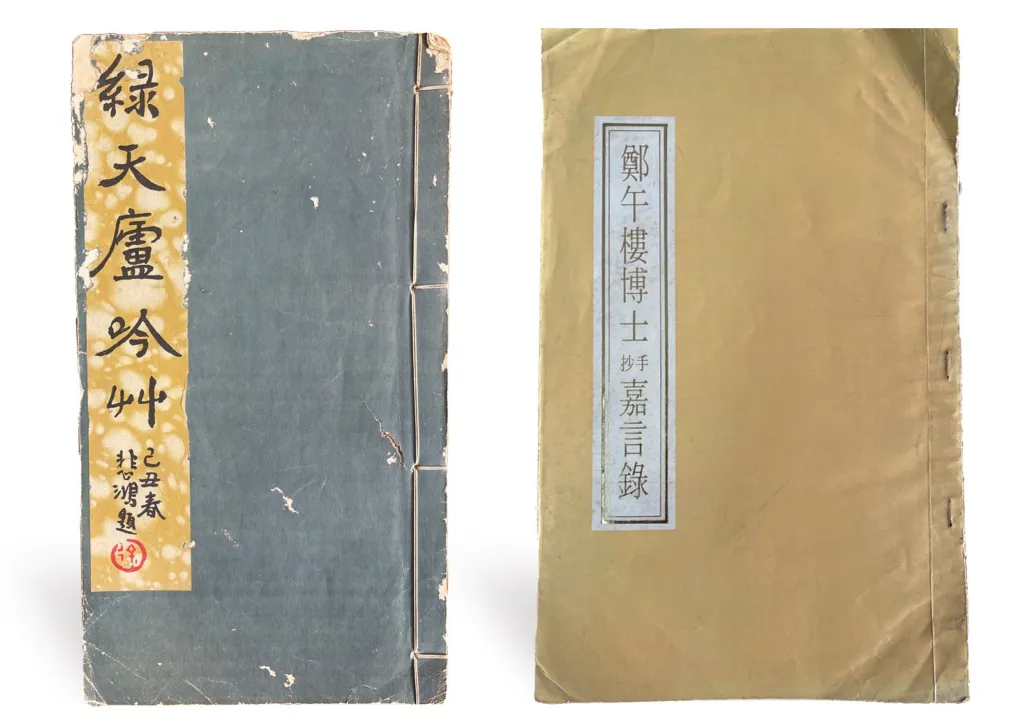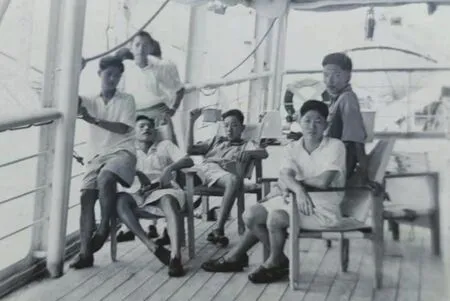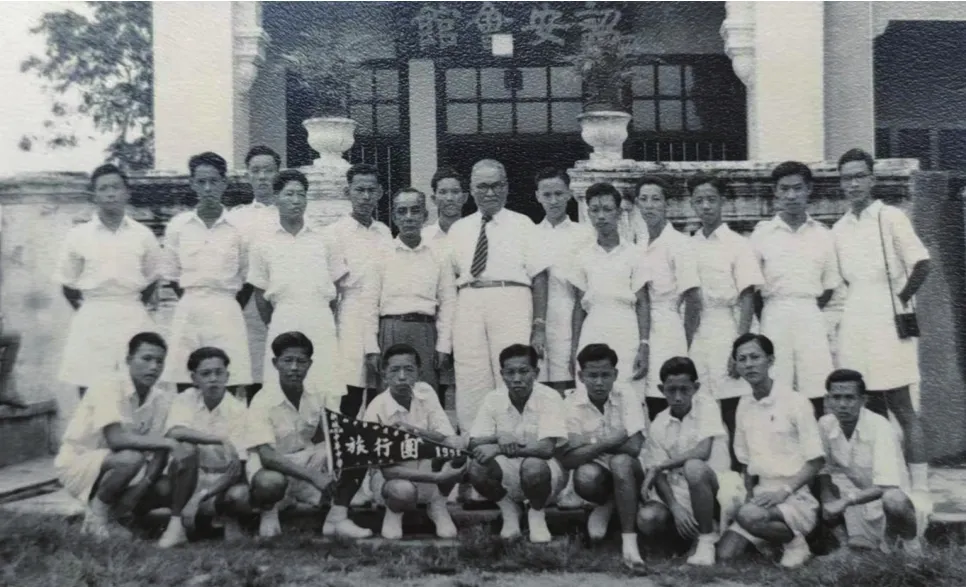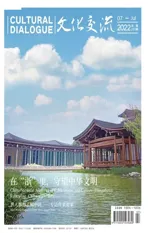三书话侨史
2022-07-28文/万禺
文 /万 禺
在杭州国家版本馆前期筹备中,有一位老先生,积极响应征集号召,热情地向开馆展捐赠了个人珍藏多年的宝贵版本书籍《温州会馆四十周年纪念特刊》《绿天庐吟草》《郑午楼博士手抄嘉言录》。这位老先生,就是浙江省侨办原副主任周添成。
侨三代的归国路
周添成,1934年生,马来西亚的“侨三代”。他在这座“东方花园”生活了18年,度过了天真烂漫的少年时代。人在海外,心系祖国,周添成自幼上华文学校,浸润在中华优秀传统文化之中,对祖国有着深深的认同感和归属感。在异国殖民者和侵略者统治下的生活经历让他意识到,祖国沦亡必失其“根”,民族不在必失其“心”,因此,他暗自立志要为祖国复兴效力。
1949年,新中国成立。摆在广大东南亚华侨面前的有四条路,一是留在当地当二等公民;二是赴欧美等西方国家留学以图发展;三是到中国台湾读书深造,学后返回出生地;最后一条路,就是回到祖国大陆,读书深造。
当时,中国大陆百废待兴,与其他选择相比,回国也许并不是众人心中的最佳选择。但周添成在进步书籍的影响下,向往新中国,向往革命。他排除重重阻力,甚至瞒着作为监护人的姨婆,毅然决然地坐上了回国的轮船。
1952年,周添成终于踏上了祖国土地。从厦门大学历史系毕业后,周添成先后担任浙江省兰溪市游埠中学英语教师,浙师大金华分校外语科副主任,省侨务办公室副主任。
作为一名归侨党员,周添成在侨务战线奋斗了十多年,兢兢业业为侨民服务。周添成为落实海外侨胞的侨房政策,为归侨侨眷在祖国开启新生活做了大量工作,赢得了侨心,侨胞们纷纷回乡捐资办公益。其间,周添成和同事们又为侨胞当起了“红娘”,做“四引进”(引进资金、引进设备、引进技术、引进人才)的工作,为浙江省的改革开放作出了自身积极的贡献。

周添成。Zhou Tiancheng.
为了更好地宣传和研究侨文化,在周添成的建议下,浙江省侨办先后创办了《浙江侨声报》与“浙江省华侨华人研究会”,为宣传侨胞、研究侨胞搭建了平台。“日本有个华侨,我们给他寄报纸,他几乎每次都会从第一版的第一个字看到最后一版的最后一个字。”周添成提及此事至今仍十分动容,这让他看到自己所做之事、所付出之努力的价值,更让他体会到了侨民对祖国的深厚情感。
今年,是周添成回国的第70年。老先生已经88岁了,他的一只眼睛经过手术被摘除了,另一只眼睛也仅剩光感,但时间和病痛都无法削减他的爱国情怀。见证了时代的波澜壮阔,周添成对自己脚下这片土地的爱意越发深沉和厚重。
捐赠三书话侨史
杭州国家版本馆成立在即,当政府向周添成发出邀请时,一向爱书如命的他没有丝毫犹豫,精心挑选,捐赠了三本能够代表浙江侨胞爱国之情的珍贵书籍。 “我年纪也大了,应该捐出去,让它们发挥更大的价值。”周添成说。
周添成从小就爱读书,陪伴他走南闯北的是一箱又一箱书籍,其中不乏珍稀版本。后因一些原因,他不得不进行处理。“诸葛亮是挥泪斩马谡,我是挥泪卖藏书啊。”老先生感慨道,“不然我可以捐得更多一点”。
《温州会馆四十周年纪念特刊(1923-1963)》一直是他的心头爱。这是新加坡温州会馆创馆40周年纪念刊,20世纪80年代由温州永嘉县侨办提供给浙江省侨办,后由周添成保管。
“很难找到第二本了。”周添成评价道。20世纪20年代,由于新加坡建筑业快速发展,需要大量木工。因此,很多温州人抓住机遇,选择去新加坡闯荡。1923年,温州会馆应运而生。在异国讨生活绝非易事,常常会出现语言不通、工资低廉、待遇不公等情况,会馆由此成为浙江同乡相互帮助扶持、情感心灵上相互慰藉的场所。
这本书记录了1923年至1963年温州会馆四十年的发展历程,资料翔实,里面还附有历届会馆主席、副主席、执行委员的珍贵历史照片。阅读这本书,让人仿佛重新回到1923年的新加坡街头,回到那个波澜壮阔的时代,感受浙江华侨们闯荡异乡的坚忍与不懈、踌躇与奋发,以及对祖国、对同胞的真挚情感。这本书表达了浙江侨胞代代相传的人文精神,对于华侨历史研究具有不可估量的价值。
第二本《绿天庐吟草》,作者管震民,祖籍台州黄岩,旅居马来西亚,从事华文教育,曾任槟城著名华校钟灵中学国文部主任,是该校“三老”之一,人称“学界泰斗”。管震民古文功底深厚,擅长诗词,钟灵中学的校歌歌词以及受外来侵略罹难的钟灵师生纪念碑上的文字均出自他之手。虽身在异国,但写文章也好,题字也罢,他总会在自己名字之前加上“黄岩”,短短二字寄托了他对家乡的热爱和思念。
管震民还经常向《新槟日报》等华侨报纸投寄诗作。《绿天庐吟草》这本诗集是他早年作品的合集,于1949年管先生70岁生日时编印,由徐悲鸿为其题写书名,槟城教育局华校督学陈翼经与该校校长、马华著名教育学家陈充恩作序。

周添成捐献藏书《绿天庐吟草》《郑午楼博士手抄嘉言录》。Poems of Lyutianlu and Handwritten Quotes by Dr Udane Tejapaibul, two rare books donated by Zhou Tiancheng.
诗,具有跨越时空的感染力,而管震民的每一处落笔都有着细腻的情感连结,每一行诗句都倾注着他的拳拳赤子心、殷殷家国情。这本书刊印量极少,是周添成海外校友罗慧吾多年前的寄赠,更显珍贵。
第三本书是《郑午楼博士手抄嘉言录》。郑午楼先生是泰国知名华人企业家、银行家,祖籍广东潮州。20世纪80年代,郑先生到杭州游玩,由周添成亲自接待。“他指定要坐红旗牌汽车,我们还特意到外面去借了一辆。”周添成笑着回忆道。融洽且颇为投缘的交谈,让二人成为了朋友。郑午楼先生回到泰国后,特意为周添成寄回了新年贺卡和手抄印影本。
郑午楼先生十分崇尚中华优秀传统文化。在此书中,他手抄了许多古文里的金玉良言,劝人向善。“君子小人本无常,行善事则为君子,行恶事则为小人”“勿以恶小而为之,勿以善小而不为”…… 华侨在中华文化传播中的贡献颇多,这本书也是一大见证。
星光不问赶路人,时光不负有心人。三本书,三个视角,交织着时代变迁的恢宏壮丽与个体叙事的细腻丰富,讲述了一代代华侨人的人生故事,是他们背井离乡在海外打拼数十载、与时代浪潮共沉浮之后仍不忘本忘家,最终沉淀在文字里的悲喜与坚持。“放在我这儿,只有我一个人看,但是如果能捐出去,可以让更多人看到华侨在异国他乡的不易与非凡贡献。” 周添成谈道。
回首1952年,周添成坐上轮船回国时,因为贫困和窘迫,他只能在简陋的下等舱里看着翻卷的浪花,望向彼时还无法停靠的维多利亚港。70年过去,下等舱的味道已经在记忆中变得不再清晰。如今的祖国国富民强,以新的姿态在时代巨浪中破风而行。在充满未知的风云变幻中,国家版本馆的版本收藏和文脉传承,不仅是为了记录和留住过去,更是为了更好地理解当下,以更加坚定的步伐迈向未来。
Sincere Love of a Returned Overseas Chinese
By Wan Yu
In building the China National Archives of Publications and Culture (Hangzhou), an old gentleman answered the call for contributions and donated three collectible books that he had treasured for decades:He is Zhou Tiancheng, the former deputy director of the Overseas Chinese Affairs Office of Zhejiang province.
Born in 1934, Zhou is a third generation Malaysian Chinese.With a strong sense of identity and belonging, he attended a Chinese language school as a boy and was immersed in fine Chinese culture. His experience of living under the rule of foreign colonists and invaders led him to realize that he needed his own roots, thus ready to strive for the rejuvenation of the motherland.
When the People’s Republic of China was established in 1949, the overseas Chinese in Southeast Asia had four options:they could remain where they were as second-class citizens, go to study in Europe, the US, or other Western countries, study in China’s Taiwan province and then go back to their birthplace, or return to China.
Returning home was not the best choice, but Zhou yearned for New China and a revolution under the influence of the books with progressive ideas. He overcame all obstacles and boarded a ship for China.
He arrived in 1952. After graduating from Xiamen University,he worked as a teacher of English at Youbu Middle School in Lanxi, Zhejiang, then as deputy director of the Department of Foreign Languages at the Jinhua campus of Zhejiang Normal University, before serving as deputy director of the Overseas Chinese Affairs Office of Zhejiang province. Looking at his life experiences, it could be seen that he has indeed fulfilled his oath sworn under the flag of the Communist Party of China — “I will devote all my life to the motherland.”

周添成捐献藏书《温州会馆四十周年纪念特刊(1923-1963)》。Special Issue of the 40th Anniversary of Singapore Wen Chow Wei Khan, a book donated by Zhou Tiancheng commemorating the 40th anniversary of Wenzhou Clan Association in Singapore.
As a Party member and a returnee, he worked hard on overseas Chinese affairs for more than a decade. He helped to reclaim the houses of overseas Chinese nationals and supported the returnees and relatives of overseas Chinese nationals to start a new life, winning them over to donate money and promote public welfare in their hometowns. Along with his colleagues, he served as a matchmaker for overseas Chinese and introduced capital,equipment, technology and talents back to China, contributing to Zhejiang’s development.
To publicize and study overseas Chinese culture, Zhou suggested establishingand the Research Society for Zhejiang Overseas Chinese. “We send these newspapers to an overseas Chinese in Japan; he would read it word for word from the first page to the last one,” Zhou was excited when he mentioned this. It showed the value of his undertaking and the strong attachment of overseas Chinese to the motherland.
This year marks the 70th anniversary of his return to China.Zhou is now 88 years old. One of his eyes was surgically removed,and the other has diminishing visual acuity. However, neither time nor illness debilitates his patriotism. Having witnessed the changes of the times, he loves China deeper and more each day.
Though a bibliophile, Zhou cherry-picked three books that represent the patriotism of Zhejiang overseas Chinese. “I’m getting older. I should give them away and have them appreciated by a wide audience,” Zhou said.
Zhou loves reading since he was a child. He moved around with his books but books he had to depose inevitably. “The torment I had is like Zhuge Liang killing his Ma Su,” he lamented,referring to an ancient Chinese politician who had to execute one of his favorite generals, “otherwise I could have donated more.”
() is his favorite. Originally provided in the 1980s by the Overseas Chinese Affairs Office of Yongjia County in Wenzhou, it was later kept by Zhou.
“It’s hard to find a second copy,” Zhou commented.Wen Chow Wei Khan or the Wenzhou Clan Association, was established in 1923 to help Wenzhounese who moved to Singapore for a living in the 1920s when carpenters were needed there.
This special issue records the 40-year development of the association. It shows the life then in Singapore, grit and perseverance of overseas Chinese, and sincere love for the motherland and their compatriots. It expresses the humane spirit passed from one generation to another and is valuable for the study of the history of overseas Chinese.
The second book,, is a collection written by Guan Zhenmin, a native of Huangyan, Taizhou, who lived in Malaysia and worked as a teacher. He was the director of the Department of Chinese Language at Chung Ling High School Pulau Pinang and was crowned an academic leading figure for his knowledge. Well versed in ancient Chinese literature and good at poetry, he wrote the lyrics of the school anthem and the texts on the memorial to the teachers and students killed by foreign invaders. He always put “Huangyan” before his name whenever he wrote articles or inscriptions, with which he expressed his love and yearning for his hometown.
Guan frequently contributed poems to overseas Chinese newspapers. This collection of his previous works was compiled and printed in 1949 with its title inscribed by Xu Beihong (1895-1953). It was a limited edition, with each copy being precious already. Zhou’s copy is unique because it was mailed by his former school mate from abroad.
The third book isTejapaibul was a well-known Chinese entrepreneur and banker in Thailand, originally from Chaozhou, Guangdong.When visiting Hangzhou in the 1980s, he was hosted by Zhou.“He specified that he wanted to take a Hongqi brand car, so we went and borrowed one,” Zhou recalled with a smile. They became friends over a happy conversation, and Tejapaibul sent Zhou a New Year’s card and a photocopy of the handwritten quotes after going back to Thailand.
Tejapaibul respected traditional Chinese culture. In the book, he handwrote quotes from ancient Chinese texts persuading people to be kind. The book is testimony to the dissemination of Chinese culture by overseas Chinese.
These books tell the life stories of overseas Chinese from three perspectives and record the sadness, joy and perseverance found in them. “I’m the only one reading them if I keep them; if I give them away, more people can learn about the difficulties for overseas Chinese and their unique contributions,” Zhou said.
China is now strong and prosperous. In a world full of unknown, the collected archives and cultural heritage can help us learn from the past, live the present, and prepare for the future.

回国时,马来西亚同窗好友上轮船为周添成送行。(资料照片)Zhou Tiancheng’s schoolmates in Malaysia see off Zhou on board the ship he took to return to China.

在新加坡华人会馆之一—诏安会馆前的合影,第三排左三是周添成。(资料照片)Zhou Tiancheng (third on the left on the third row) in a group photo taken in front of the Chao Ann Association, one of the many Chinese clan associations in Singapore.
